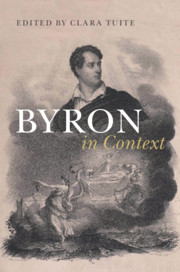Book contents
- Byron in Context
- Byron in Context
- Copyright page
- Dedication
- Contents
- Illustrations
- Contributors
- Chronology
- Abbreviations and Note on the Text
- Introduction
- Part I Life and Works
- Part II Political, Social and Intellectual Transformations
- Chapter 7 Politics
- Chapter 8 War
- Chapter 9 Greece’s Byron
- Chapter 10 Byron’s Italy
- Chapter 11 Orientalism
- Chapter 12 Religion
- Chapter 13 Natural Philosophy
- Chapter 14 Sexuality
- Chapter 15 Libertinism
- Chapter 16 Fashion, Self-Fashioning and the Body
- Part III Literary Cultures
- Part IV Reception and Afterlives
- Further Reading
- Index
Chapter 14 - Sexuality
from Part II - Political, Social and Intellectual Transformations
Published online by Cambridge University Press: 04 October 2019
- Byron in Context
- Byron in Context
- Copyright page
- Dedication
- Contents
- Illustrations
- Contributors
- Chronology
- Abbreviations and Note on the Text
- Introduction
- Part I Life and Works
- Part II Political, Social and Intellectual Transformations
- Chapter 7 Politics
- Chapter 8 War
- Chapter 9 Greece’s Byron
- Chapter 10 Byron’s Italy
- Chapter 11 Orientalism
- Chapter 12 Religion
- Chapter 13 Natural Philosophy
- Chapter 14 Sexuality
- Chapter 15 Libertinism
- Chapter 16 Fashion, Self-Fashioning and the Body
- Part III Literary Cultures
- Part IV Reception and Afterlives
- Further Reading
- Index
Summary
“Sexuality” refers to “a person’s sexual identity in relation to the gender to which he or she is typically attracted” (OED def. 3). When considering Byron’s sexual identity, several interpretative problems arise. Although sexuality is now seen as a container for identity, it did not always have such powers. Philosopher Michel Foucault alleged a turn from sex to sexuality, which he suggests does not happen until the term “homosexuality” was coined in 1869, when as he put it, “the homosexual became a personage.” Before the homosexual, there was the sodomite, whose identity consolidated around the performance of nonnormative sex acts (acts outside of reproductive intercourse). In this view, these acts were not yet part of identity because the discipline of psychology had not yet provided concepts like dispositions and preferences to stitch acts to identity.
- Type
- Chapter
- Information
- Byron in Context , pp. 117 - 123Publisher: Cambridge University PressPrint publication year: 2019

